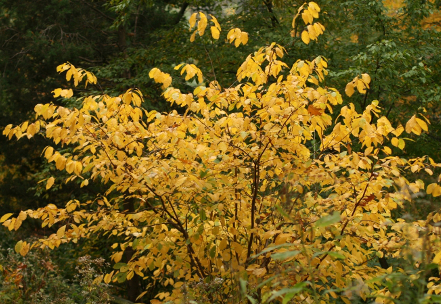Click below to listen to my 2 min. Garden Bite radio show: Spicebush
Audio PlayerFall is here with the celebration of the autumnal equinox coming on Saturday! I love this time of year for many reasons including the fact that it’s a good time to plant trees and shrubs. If you’d like to try something with a bit of splash and spice, think Spicebush.


This is a multi-season interest plant that flowers before the leaves show up. The citrus yellow blooms are aromatic and reminiscent of forsythia. Both the male and female plants have flowers but the male plants are showier.


To produce fruit, the female plant needs pollination from the male plant. The oblong berries that show up from July into September are beloved by wildlife, including songbirds, but can often be hidden by the bright yellow fall leaves until they drop off in the cold.

It grows in partial shade as it’s natural habitat is an understory shrub, however it will do well in sun, in fact, you’ll get the brightest fall color when planted in sun. The leaves have a wonderful spicy scent when crushed and can be used to make tea along with the flowers, twigs and bark. The plant has been used for medicinal purposes as well. Wildman Steve Brill has info to explore.
Penn State reports thirty-nine different oils in its leaves, twigs and berries, undoubtedly some of them will have medicinal powers. Spicebush, also known as Lindera benzoin, grows from 6 to 12 feet at maturity. Once established, it really doesn’t like to be moved, so remember to plant it in the appropriate place OR you can prune it to a specific size.
This shrub is especially attractive to certain butterflies and birds, in particular the Swallowtail. They eat nectar from the flowers before laying their eggs on the leaves. The hatched larvae then feed and pupate on the leaves, rolling them for protection. They do only minor damage and they’re caterpillars are super cute!

Those aren’t eyes…. it’s the color of their skin!


